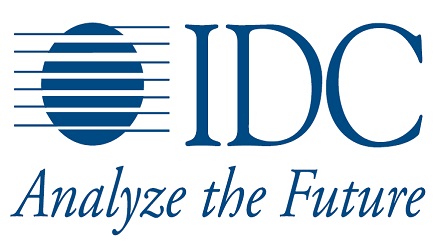Telecom
Smartphones, Software Leading Global IT Market Spending

According to the newly published International Data Corporation (IDC) Worldwide Black Book, recent volatility will gradually give way to a more positive outlook for IT spending in the second half of 2014.
The report contains that with the U.S. and other mature economies mostly heading in the right direction and a significant commercial PC refresh cycle already underway, improvements in business confidence are set to drive a moderate infrastructure upgrade cycle over the next 12-18 months, while investments in software and services will continue to accelerate.
Worldwide IT spending is now forecast to increase by 4.5% in 2014 at constant currency, or 4.1% in U.S. dollars.
A significant proportion of this growth is still being driven by smartphones, as IT spending excluding mobile phones will increase by just 3.1% this year in constant currency (2.8% in U.S. dollars).
Aside from smartphones, the strongest growth will come from software, including rapidly expanding markets such as data analytics, data management, and collaborative applications including enterprise social networks.
The 3rd platform pillars of Big Data, Social, Mobile and Cloud will continue to drive virtually all of the growth in IT spending, while spending on 2nd pPlatform technologies will remain effectively flat.
Meanwhile, although some emerging markets remain constrained by macroeconomic and geopolitical wild cards, there is now significant pent-up demand for IT investment that will drive stronger growth next year in markets including India, Brazil, and Russia.
Pent-up demand has already driven a significant rebound in both consumer and enterprise IT spending in China this year, as confidence stabilizes.
While mature economies are still driving the upside in 2014, emerging markets will once again dominate in 2015.
IDC said that Cold snap and wild cards impacted it spending, but underlying demand is strong
Some IT market segments performed weaker than expected in the first quarter of 2014 (1Q14), in line with the weather-related slowdown in U.S. output and the impact of wild card events including the conflict in Ukraine.
In particular, an overdue enterprise infrastructure refresh cycle was disrupted by short-term declines in business confidence.
However, strong underlying demand for this investment cycle will drive improvements in the server, storage, and network infrastructure markets in the coming months.
“At the beginning of 2014, we asserted that businesses would choose to fix the roof while the sun was shining,” said Stephen Minton, vice president in IDC’s Global Technology & Industry Research Organization (GTIRO).
Minton added that, “Unfortunately, the weather was literally much colder than expected during the first quarter. The good news is that the U.S. economic outlook has already brightened and this will drive a period of moderate but long-awaited investment in mission-critical infrastructure over the next year.
However, accelerating adoption of cloud services will continue to impact sales of traditional on-premise equipment, packaged software, and IT services. This capital spending cycle will be mild by historical standards.”
Meanwhile, PC refresh stronger than expected in mature economies, tablet shipments weaker
The commercial PC refresh has proven stronger than originally forecast.
As a result, IDC now forecasts PC spending will increase by 3.5% in 2014 (the fastest pace since the post-financial crisis rebound of 2010).
Western Europe has also seen an improvement in PC shipments, although PC spending in Europe will still be down by 1% due to average price declines.
The PC cycle has already driven a market upturn in Japan, where economic growth and upcoming tax increases drove a surge in capital spending in 2013 (PC spending in Japan increased by 6% last year, but will decline by -4.5% this year).
“The end of support for Windows XP is obviously part of the story, but there has also been a transition of some spending from tablets to PCs as consumers and businesses have allocated disposable income and IT budget to replacing older notebooks and desktops rather than upgrading their relatively new tablets.
“The tablet market is also more sensitive to economic wild cards and price competition, now that penetration rates have increased. There’s still plenty of growth ahead for tablets, however, and it would be premature to say that improvements in the consumer PC market represent anything like a reversal of the long-term shift to tablets and hybrids over the long term,” said Minton.
The U.S. tablet market is now forecast to increase by just 2% this year, but will rebound to 7% growth in 2015 as the PC cycle begins to wane.
Worldwide tablet spending has slowed from 29% year-over-year growth last year to 8% in 2014, but will accelerate back to double-digit growth next year (10%).
Penetration rates in emerging markets such as China will continue to increase, while some enterprise spending will shift back to tablets.
Pent-up demand and mobile driving growth in china, with other emerging markets to follow
The economic slowdown in 2013 had a negative impact on IT spending in China, but this also created a significant swell of pent-up demand that is now driving improvements in technology investment. IT spending growth in China decelerated to 8% last year but is on course for 13% growth in constant currency in 2014.
According to Minton, “Smartphones are a large factor in China’s growth as Chinese manufacturers have successfully expanded the customer base with new, price-competitive products that have driven overall volume. But while smartphones are a big part of the story, there has also been a significant upturn in business spending on infrastructure and software.”
Excluding mobile phones, IT spending in China will increase by 5% this year (up from growth of just 2%, excluding phones, in 2013).
Server spending in China will increase by 7% (compared to 0% in 2013), storage spending by 8% (up from 1.5% in 2013), and software by 9% (up from 7% last year), but overall market growth is still weighed down by the declining PC market.
Other emerging markets are likely to improve over the next 12 months as business confidence stabilizes.
IT spending in India will increase by 15% next year, up from 8% in 2014. In Brazil, the market will accelerate from 10% growth this year to 13% next year. In Russia, where the crisis in Ukraine has damaged business and investor confidence since the beginning of the year, the market is set to decline slightly in 2014 before rebounding to 7% growth in 2015.
Mature economies have remained more stable since last year, with market growth often outpacing expectations.
The U.S. IT market will increase by 4% this year, and Western Europe will maintain a 2% growth rate overall. Total worldwide IT spending will reach almost $2.1 trillion in 2014.
Including telecommunications services, the worldwide ICT market will increase by 4% to $3.7 trillion, with telecom services growth of 4% driven by mobile data services and increasing broadband penetration.
IDC’s Worldwide Black Book provides forecasts for IT spending in 54 countries around the world.
IT spending forecasts focus on 25 individual market segments across hardware, software, IT services, and telecom services for individual countries in all regions including North America, Latin America, Western Europe, Eastern Europe, Asia/Pacific, the Middle East, and Africa.
The Worldwide Black Book Query Tool presents all data in the following exchange rate views: U.S. dollars in constant currency, annual and year-to-date exchange rates, and local currency.
Additional products in this category include the Worldwide Enterprise Black Book, which analyses annual IT spending in relation to four company size segments based on employee counts.
The Worldwide Black Book, Premium Edition, includes cloud spending forecasts, quarterly IT spending forecasts by region, IT vendor market share analysis, macroeconomic indicators, IT/Internet penetration, and CIO survey data.
The United States Black Book: State IT Spending by Vertical Market is a quarterly analysis of the status and projected growth of the IT industry in 50 states and across 15 vertical markets.
Telecom
MoMo PSB, SMEDAN Forge Pact to Digitise Nigeria’s SMEs

MoMo PSB, MTN Nigeria’s fintech powerhouse, sealed a game-changing pact with the Small and Medium Enterprises Development Agency of Nigeria (SMEDAN) on February 3 at its Victoria Island headquarters, unleashing digital and financial tools to turbocharge SMEs nationwide for seamless operations, revenue surges, and sustainable scaling.

MoMo PSB, SMEDAN
The partnership arms SMEDAN-registered merchants with MoMo’s multi-channel arsenal—apps, POS, USSD, partner portals, and custom platforms—to hoover payments across streams, automate payrolls, juggle tills and shop chains, and boss core business metrics from one slick dashboard.
This powerhouse duo targets Nigeria’s SME engine room, where digital chokepoints throttle growth, injecting MTN’s MoMo muscle to slash friction and unlock efficiencies for mama-put hustles to mid-tier factories alike.
Industry watchers hail the MoU as a masterstroke in President Tinubu’s economic revival playbook, fusing government SME scaffolding with private-sector fintech firepower to birth a new breed of digitally dominant entrepreneurs primed for AfCFTA conquests.
Telecom
MTN Ignites Teacher Revolution: 5,000 Digitally Armed for Phase Two

MTN Foundation and SAIL Innovation Lab have roared into Phase Two of their blockbuster Teachers Fellowship Programme, onboarding 5,000 elite educators from Nigeria’s 36 states and the FCT since January 13 to turbocharge public schools with cutting-edge digital wizardry and global teaching firepower.

MTN
This mobile-first crusade, laser-focused on arming primary and secondary school titans for the digital economy showdown, kicks off with a grueling four-week virtual bootcamp via WhatsApp and Google Classroom—slashing travel barriers for even the remotest rural warriors.
Organisers promise peer-to-peer fireworks and real-time gut-checks, capping Stage One with a virtual gala saluting milestones before culling the pack to a fierce “Top 500” via engagement, assessments, and hustle for Phase Two’s inquiry-based mastery and deep-dive digital metamorphosis.
MTN Foundation’s Executive Director Odunayo Sanya lit the fuse: “Teachers are the backbone of our education system. By empowering them with digital competencies and innovative teaching methods, we are directly investing in the future of our youth.
This Fellowship Programme is designed to ensure that our educators are not just keeping pace with global best practices but are actively shaping the next generation of innovators and leaders.”
Nigeria’s heftiest private teacher uprising scales from last year’s triumphs, minting classroom commandos as state ambassadors to ignite inquiry-driven, tech-fueled learning revolutions coast-to-coast.
Telecom
Onafriq, PAPSS Launch Wallet-Based Payments Pilot from Nigeria to Ghana

Onafriq Nigeria Payments Ltd, a CBN licenced payment service provider, partners with The Pan-African Payment and Settlement System (PAPSS) to pilot the continent’s first wallet-based outbound payments from Nigeria to Ghana – fully in Naira and instant, without relying on hard currency conversion, in partnership with Banks and Mobile Money Operators.

The pilot service, approved by the Central Bank of Nigeria (CBN), enables cross-border intra-Africa payments for individuals, merchants, and traders.
In particular, the service will benefit SMEs, the real engine of intra-African trade; all now have access to a faster, cheaper way to reach customers and suppliers across the border.
By reducing barriers to cross-border trade, the new service will allow these businesses to grow their addressable markets and activity. From the 1st of December, this service will be fully operational for a 6-month period.
Through the partnership with PAPSS, Onafriq is supporting the operationalization of the AfCFTA (Africa Continental Free Trade Area) mandate.
The mandate itself is driving tariff-free trade for the 54 member states of AfCFTA. Within the partnership itself, Onafriq provides the mobile money rails, with an ecosystem consisting of over 1 billion mobile wallets.
Meanwhile, PAPSS brings a network of over 160 commercial banks, representing an ecosystem of more than 400 million bank accounts across its 19 African countries of operation.
The two partners are essentially seamlessly connecting two worlds: mobile money and banking. As a consequence, intra-African trade transactions will take place more easily and opportunities will be created.
Currently, Africa is made up of bank and mobile-led markets, with siloes often inhibiting transactions between these economies. However, this partnership will remove these boundaries. With over one billion mobile wallets and 500 million bank wallets across Africa, this partnership will allow for cross-border collaboration at scale.
This partnership builds on Onafriq and PAPSS’ existing partnership for payments into Ghana, announced earlier this year.
Mxolisi Msutwana, Managing Director Anglophone West Africa said, “Our work with PAPSS shows what collaboration at scale can unlock—seamless, secure connections between banking systems and mobile money ecosystems.
“This is how we open bi-directional trade corridors, reduce costs for businesses, and give African enterprises the rails they need to trade with confidence in their own currencies. The vision is continental, but it starts with practical steps like this one.”
Ositadimma Ugwu, Chief Information Officer, PAPSS, added “Too often, African businesses and individuals see borders as roadblocks instead of opportunities. With this step, we’re challenging that mindset, giving Nigerians the ability to send value next door with the same ease as sending a text message.
“Our vision is simple: make Africa’s borders invisible to payments. This pilot makes that a reality, moving us closer to a continent where payments don’t pause at the border.”
This new Nigeria-to-Ghana outbound capability builds on the successful Ghana-to-Nigeria instant payments corridor launched earlier this year – further proof that Africa’s payments future is local, instant, and inclusive.

 E-Financial2 days ago
E-Financial2 days agoAccidental Billionaire Opts for Jail Instead of Returning Money Credited Him by Mistake

 News2 days ago
News2 days agoUS Set to Deport 79 Nigerians on Criminal List

 News2 days ago
News2 days agoUngoverned AI is Quietly Scaling Risk in Nigeria – Dr. Naiho

 E-Financial2 days ago
E-Financial2 days agoSEC Warns of Potential Ponzi-style Risks in AURUM BOT, ModMount

 Telecom2 days ago
Telecom2 days agoAirtel Nigeria Commits to Boosting Nigeria’s Digital Infrastructure

 Telecom2 days ago
Telecom2 days agoGoogle, African Partners Launch WAXAL to Empower 100m Africans in AI Era

 News2 days ago
News2 days agoFirst Lady Commissions Dream Centre @ OAU

 Telecom2 days ago
Telecom2 days agoNCC Hails $1Bn Telecom Surge as Networks Hit New Highs















